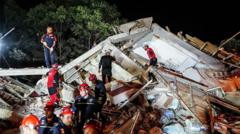**Amid rising tensions following a missile strike by Iran on an Israeli hospital, Israel's defense minister has vowed to escalate military action against strategic Iranian targets. This marks a significant escalation in the ongoing conflict, with severe implications for both nations and regional stability.**
**Israel Plans Stiff Counteroffensive After Iranian Missile Attack Hits Hospital**

**Israel Plans Stiff Counteroffensive After Iranian Missile Attack Hits Hospital**
**The Israeli government announces intensified military operations against Iran following missile strikes that affected a southern hospital, igniting concerns over regional escalation.**
In a dramatic escalation of the ongoing conflict, Israel's Defense Minister Israel Katz announced a commitment to intensify military operations against Iran in response to an Iranian missile striking the Soroka Medical Center in Beersheba. According to Israeli military reports, this is the first hospital directly hit since the latest hostilities began, resulting in considerable structural damage and injuring several patients.
Katz declared that the Israeli military would target “strategic assets” and destabilizing elements within the Iranian regime. This declaration follows a volley of retaliatory missiles from Iran that not only struck the hospital but caused various damages across multiple Israeli regions. Israeli Prime Minister Benjamin Netanyahu has backed calls for further escalation, suggesting the need to eliminate threats posed by Iran's military capabilities.
Reports indicate at least 44 people in Israel sustained minor injuries from the recent barrage, which has raised global concern about an evolving humanitarian crisis. The Soroka Medical Center stated it had managed to evacuate most serious cases, mitigating possible casualties during the strike. However, Katz referred to Iran’s actions as potential war crimes, pointing to the international legal obligations surrounding the protection of medical facilities.
Amidst these developments, U.S. President Donald Trump indicated that a military response was being deliberated, expressing an inclination towards a decisive action but remaining open to possible negotiations. Trump stated that he enjoys making decisions at the last minute, hinting at an evolving strategy in the volatile situation.
Meanwhile, a senior Iranian official announced Tehran’s readiness to engage in diplomatic talks, signaling a dual stance of aggression coupled with openness to negotiation. This comes amid conflicting statements from Iran's Supreme Leader Ayatollah Ali Khamenei, who warned against U.S. intervention, predicting severe repercussions.
Nor has the cyber battlefield been quiet; a hacking group known as Predatory Sparrow claimed a substantial cyberattack on Iranian crypto assets, further complicating an already intricate situation between the two nations.
International observers are closely monitoring the hostilities as both sides prepare for what could be a sustained increase in violence. Reports suggest that the casualty figures are expected to rise on both sides, highlighting the urgent need for humanitarian considerations amidst ongoing military strategies. As the conflict unfolds, the emphasis on diplomacy may prove vital in averting a broader regional conflagration.




















